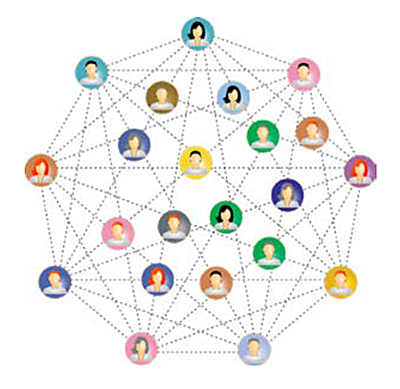Leaders are Great Networkers
Author: Glyn Jones, CRSP
Posted on May 14, 2021
Category: Professional Development
You're attending a CSSE conference or one of your local provincial conferences. It's Day 1 of the event and you're standing next to the registration desk. Given there will likely be 500+ people attending, how many people would you know or would know you? If the answer is not 100+, you have got some work to do on your network!

In today's organizations, networking is essential to effective leadership. Leaders who are skilled networkers have access to people, information, and resources needed to answer questions and solve problems. Neglecting networking or network development has the potential to sideswipe your leadership development journey.
I can't recall how many times I have had colleagues ask me if I have heard of any jobs for them right after they get laid off. I always say, "Just tap into your network and you'll find good leads for a job in a few days or so." The response I often get is, "Yes, that is a good idea, if only I had a network." It is not until you need a network that you realize how important it is to have a well-developed one!
I would say we all "know" networking is beneficial and most of us believe we should do more. We need to grow our professional network. Networking expands our base of friends and acquaintances. It is needed to be known and to get to know people. It takes time and to say it is an investment that takes years is not an exaggeration. Busy schedules get in the way and so we procrastinate. Networking takes energy and it takes time so it requires a conscious effort to work on it little by little every day.
However you want to measure it, the evidence is overwhelming that great networkers accomplish more and reach higher levels of achievement. This includes being more likely to develop into opportunities for leadership roles in businesses and other types of organizations. Here are a few reasons why this is true:
Networking creates opportunity - Activity is rewarded. If someone asks if you want to get involved in a committee, go to a meeting of safety professionals, get involved in a task force, or some other activity, the answer should always be yes. Any such activity will be rewarded, and although likely disconnected in time and space, it WILL BE rewarded.
Why is this, you ask? The most obvious and traditionally viewed benefit of networking is that you are more likely to come across an opportunity that may be of interest. It is a statistics thing! The safety professional with 100 contacts is more likely to be introduced to a new and better opportunity than someone who has a limited social life or who works in a job that keeps them isolated.
The focus of good networking is on "giving" to the relationship, with the understanding that the return on investment will come much later and be much larger. You must believe! Your focus needs to be on "good" networking and this is a skill that can be developed.
Want to strengthen your network? Now is the time to start!

You need to be available
Every successful person has at some point in their life been given a first big break or great opportunity. It is easy to focus on their success but what we forget is that likely they tried 100 times before getting the big break. Legend has it that Gone with the Wind was rejected by 38 publishers: Walt Disney was turned down 302 times before finally getting financing for his dream of creating Walt Disney World: and KFC founder Colonel Sanders was rejected 1,009 times before finding a taker for his chicken recipe. You have to get out there. Luck is the most logical of things - the more people you are exposed to, the more chance there is to get lucky. Leaders network more so they are in more situations where opportunity can "see" them.
Your reputation is connected to your network
Choose your network carefully. Meet with thousands but connect with just hundreds. Assess whether each potential networker offers value. Connect with those with whom you want to be associated. By managing the quality of your network, it is likely that referrals from within will be to similar types of people.
Leaders give to receive
You have heard the expression "give if you wish to receive". Giving is a key to leadership success. Success is the accidental result of giving. By providing something that others need, you will be rewarded many times over. The greatest leaders in any profession are those who serve. A bigger network allows us to serve more people. This greater service pays bigger dividends. The greatest leaders invest their time to build focused networks so they can get to know more about others and serve them in some way.
Conclusion
Networking is the purest form of giving where you try to help others so they will, at some point later, be willing to help you. Networking with intent to give or serve others forges relationships that will stand the test of time and be an asset in your life and on your leadership development journey.
